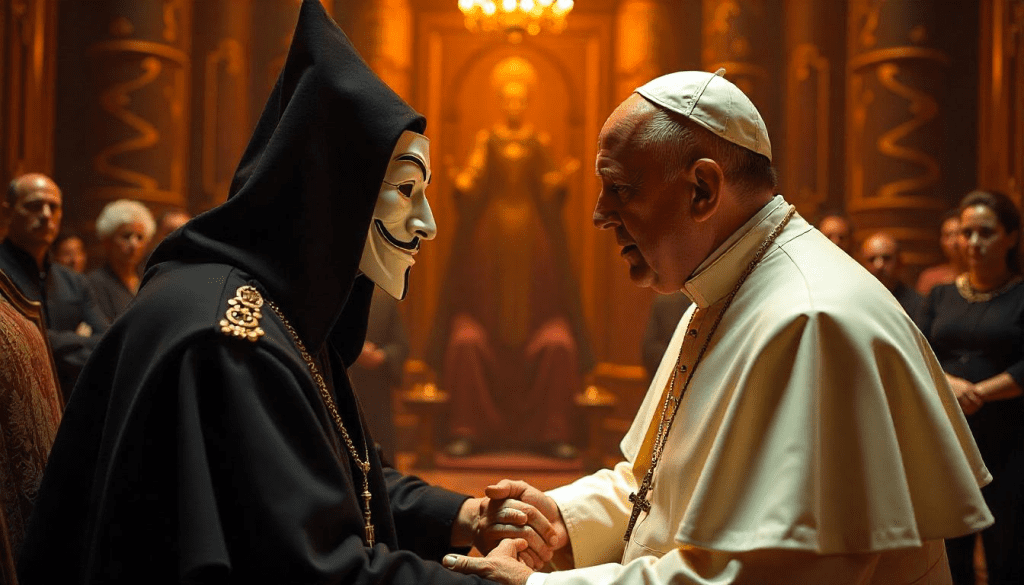In the modern digital age, two entities stand as symbols of contrasting ideals: Anonymous and Pope Francis. On one side, you have Anonymous, the elusive, decentralized group of hacktivists known for exposing corruption, fighting censorship, and challenging the establishment. On the other, you have Pope Francis, the leader of the Catholic Church, who has worked to modernize the Church’s stance on various global issues while maintaining its traditions. Their paths have occasionally clashed, making the conflict between these two forces an intriguing battle between digital activism and religious influence.

Who is Anonymous?
Anonymous is not a single person but a collective of hackers, activists, and whistleblowers who operate under a common ideology. Their main goal is to fight against government overreach, corporate greed, and internet censorship. They are well-known for their signature Guy Fawkes masks and their ability to launch cyberattacks, expose secrets, and bring attention to social issues.
Some of Anonymous’ most notable actions include:
- Exposing government surveillance programs.
- Taking down websites of oppressive regimes.
- Supporting movements like WikiLeaks, Occupy Wall Street, and Black Lives Matter.
- Targeting institutions accused of unethical practices, including religious organizations.
Their activities often spark debates about the ethics of hacktivism and whether cyberattacks are justified forms of protest or dangerous crimes.
Who is Pope Francis?
Pope Francis is the head of the Roman Catholic Church and one of the most influential religious figures in the world. Since his election in 2013, he has made significant efforts to reform the Church, addressing issues such as poverty, climate change, and social justice. He has been praised for his humility and progressive views but has also faced criticism for the Church’s historical and ongoing controversies.
Some key aspects of Pope Francis’ leadership include:
- Advocating for the poor and marginalized.
- Addressing climate change and environmental issues.
- Calling for greater transparency within the Catholic Church.
- Facing scrutiny over the Church’s handling of abuse scandals.
While Pope Francis has attempted to modernize the Church, he still represents a powerful religious institution that has faced numerous allegations of corruption and misconduct.
The Clashes: Anonymous vs Pope Francis
1. Targeting the Vatican’s Secrecy
Anonymous has often targeted organizations that they perceive as secretive or corrupt. The Vatican, as one of the oldest and most influential religious institutions, has naturally come under their scrutiny. Anonymous has accused the Church of hiding financial misdeeds, covering up abuse scandals, and exerting too much influence over political and social affairs.
2. The Vatican Cyberattacks
In multiple instances, Anonymous has launched cyberattacks against Vatican websites, temporarily taking them offline. These attacks were intended as a protest against the Church’s alleged role in historical oppression, abuse scandals, and financial corruption. Pope Francis has not directly responded to these attacks, but the Vatican has consistently reinforced its cybersecurity measures to counter them.
3. Corruption and Financial Transparency
The Vatican Bank has faced various financial scandals over the years, leading to calls for greater transparency. While Pope Francis has taken steps to reform the financial system within the Church, Anonymous remains skeptical, arguing that these efforts are not enough. Hacktivists have demanded full disclosure of the Church’s wealth and financial dealings, claiming that religious institutions should not hoard massive amounts of money while poverty persists worldwide.
4. Social Justice vs. Systemic Control
Both Pope Francis and Anonymous advocate for social justice, but their approaches differ drastically. Pope Francis preaches reform within the existing religious framework, while Anonymous believes in dismantling corrupt systems entirely. The Church has historically been resistant to rapid change, which contradicts the fast-paced activism and direct action tactics that Anonymous employs.
The Bigger Picture: What This Battle Represents
The conflict between Anonymous and Pope Francis is more than just a personal battle; it represents a larger struggle between hacktivism and religious authority. It raises important questions:
- Should religious institutions have so much global influence?
- Is hacktivism a legitimate form of protest, or does it create more harm than good?
- How do we balance faith-based leadership with modern ethical responsibilities?
- Who should control societal values—governments, religious institutions, or grassroots movements?
The Future of the Battle
While Pope Francis continues to lead the Catholic Church, Anonymous remains active, challenging institutions they perceive as corrupt. Their methods differ—Pope Francis uses diplomacy and theological reform, while Anonymous uses cyberattacks and public exposure to resist authority.
This battle will likely continue as concerns over religious influence, financial transparency, and digital freedom grow. Whether you see Anonymous as heroes or criminals, and Pope Francis as a reformer or a symbol of outdated religious power, one thing is clear: the clash between faith, activism, and technology is shaping the future of our world.
Conclusion
The story of Anonymous vs Pope Francis is not just about one religious leader and one hacker group. It is about the fight for control over societal values, financial transparency, and institutional accountability. While Pope Francis represents a reformed approach to religious leadership, Anonymous stands for resistance against secrecy and control.
As technology continues to evolve, these clashes will likely become even more significant. Whether you support Anonymous, Pope Francis, or neither, their impact on society cannot be ignored. The real question is: Who should hold power in shaping our global future—religious institutions, governments, or the people?
What do you think? Is Anonymous justified in their criticisms of Pope Francis, or is he genuinely working toward positive change? The debate is far from over.